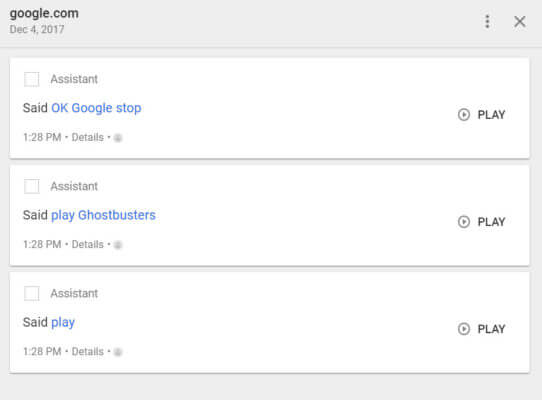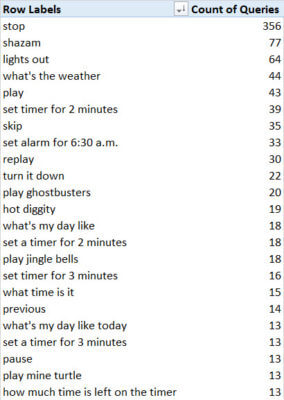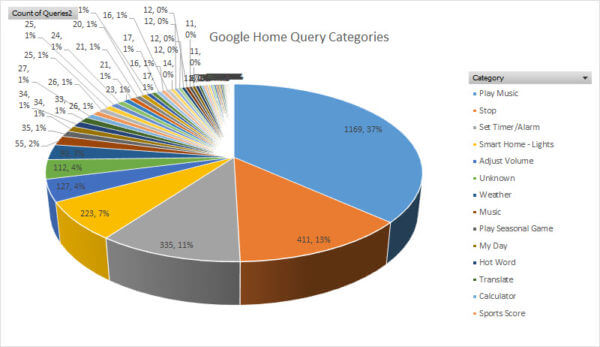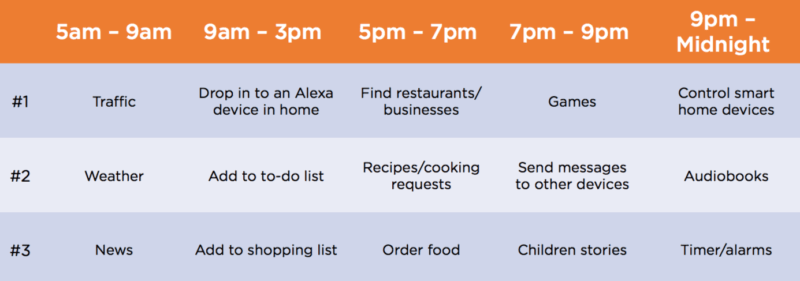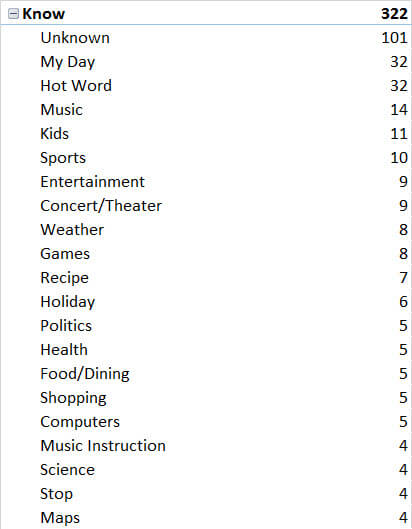What 3,000 voice search queries tell us about the ‘Voice Search Revolution’
Do you think voice search is the next "big thing" digital marketers need to watch for? Contributor Bryson Meunier isn't so sure and feels there are limited marketing opportunities, based on his research.

You may have heard a voice search revolution is upon us. It seems a new article pops up every day saying marketers need to drop everything and get in line.
Usage is up and rising, but does that mean more opportunities for marketers?
Google Home
My family of five in the suburbs of Chicago, Illinois, has been using Google Home for a little over a year. We use it daily and now have five Google Homes in the house since the kids got Google Home Minis for Christmas.
Google returns personalized data in MyActivity, which you can filter by voice search queries. It’s not easy to extract, but when I did it manually, I extracted a total of 3,188 queries that mostly occurred between October 8, 2017, and January 10, 2018. These were mostly queries using Google Home, but some of them were voice queries from smartphone, desktop and tablet.
I have three kids under 8 years old, so not every query was crystal clear. When I categorized the queries, “unknown” was my sixth-largest category, and it comprised queries like my six-year-old daughter asking Google Home, “Does Google Home belong to me or my little brother” and queries I didn’t know we were making, like “All right, Blake if you’re going to be good you can come down,” after I told my 3-year-old he could come down from his time out.
But the findings largely show what my family uses the Google Home for. I am sharing my findings in hopes it will help other marketers find actual ways to promote their businesses with these devices and will provide value to themselves and to searchers.
Keep in mind while most of these are Google Home voice queries, we also search by voice from our smartphones and tablets, and those voice-based queries are included here as well.
Top queries
By far, the number one thing we asked of our Google Home was to stop, which usually meant to stop playing “Cherry Bomb,” “Ghostbusters,” “Jingle Bells” or some other song my 3-year old decided was worthy of playing 10 times a day.
The next top query for us is “shazam,” which is not the music recognition app in our case, but my programmed shortcut for “turn the lights on.”
The 12th most popular query, “hot diggity,” is my programmed shortcut for “turn the lights out.”
Of the remaining top queries, none of them go to local or organic search results, which offers nothing for marketers to take advantage of:
Turning the list of more than 3,000 queries into a tag cloud of our most frequently used words shows my family likes to use the smart speaker for playing music, turning the lights on and setting timers and alarms more than anything.
Top categories
When I categorized all 3,000 queries, that’s exactly what I found. Playing music, stopping music, timers, alarms, turning lights on and off and adjusting volume are by far the most popular uses my family has for Google Home, making up a full 72 percent of our usage over three months.
After the “unknown” category at 4 percent, the remaining 24 percent of usage breaks down to 3 percent looking for information on weather, 2 percent looking for information on music, and 19 percent comprised of 56 categories with 1 percent or less of usage.
Although this is just my family we’re talking about, it aligns pretty well with the usage categories mentioned in the Smart Audio report from January 2018 released by National Public Radio (NPR) and Edison Research.
In the report, they cite playing music as the #1 activity by far that the smart speaker is used for socially:
Although the time of day wasn’t something I looked at in my family’s data, the top tasks that Edison Research and NPR found in their survey were top tasks for my family as well:
Maybe of interest to marketers is that only one of the 3,000-plus queries in my dataset was an Actions on Google query, with zero percent of the total usage. My family may be an anomaly, as the smart audio report said that 43 percent of smart speaker owners would be interested in using skills from companies or brands they follow on social media. But for us, Google does a good job doing what we ask, and we don’t feel the need to use another assistant.
Prior to Google releasing the directory of Actions on Google, it wasn’t all that easy to know what skills were available. Hoping this will change going forward as Actions on Google is a clear opportunity for brands if the traffic is there.
Query intent
Even more important for marketers than Category is the specific intent of the query. As I mentioned in my first column on Google Home, the only actionable categories for marketers currently available other than Actions on Google are Facts, Info and Local Guide.
Facts and Info correspond to the query intent Know and Know Simple (as defined by the Google Quality Rater Guidelines), and Local Guide corresponds to the Visit in Person query intent. However, those intents made up just 23 percent of my family’s usage, with 75 percent going to Do-Device Action queries, which don’t even use search results for their answers:
Effectively, Know Simple query intent is not all that actionable, as it simply reads a short answer without giving context, leaving just 11 percent of the queries that might lead to a site link. And of those, only a little more than 40 percent are powered by search results, and thus possible for marketers to gain visibility for.
If this doesn’t look like much of a voice revolution to you, you’re not alone. When it comes to query intent and categories of queries used by my family over three months, usage may be high, but the opportunity for marketers is relatively low.
Query length
Query length is often mentioned when talking about voice search, as Microsoft and others have said that voice queries are generally longer than typed queries. That is true with my family as well, with the average word count at four and the average length of 20. Word count and query length differ, though, based on intent.
Contributing authors are invited to create content for Search Engine Land and are chosen for their expertise and contribution to the search community. Our contributors work under the oversight of the editorial staff and contributions are checked for quality and relevance to our readers. The opinions they express are their own.
Related stories
